LONDON: Carlos Ghosn, the auto-executive-turned-fugitive who plotted a brazen escape from Osaka in December 2019 following his arrest by Japanese authorities on charges of financial misconduct, has denounced what he calls Japan’s darker side — its legal system.
Ever since the French-Lebanese-Brazilian former chairman of Japanese car giant Nissan was arrested at Tokyo International Airport on Nov. 19, 2018, before launching a daring escape a year later hidden inside a luggage box on a private jet, the world has watched Ghosn’s capers with rapt attention.
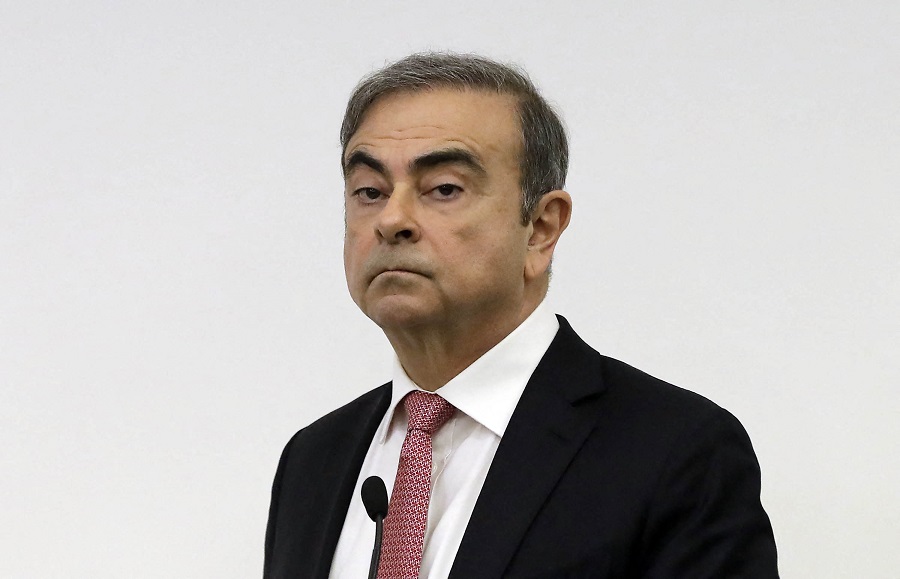
Former Renault-Nissan boss Carlos Ghosn looks on before addressing a large crowd of journalists on his reasons for dodging trial in Japan. (Supplied)
Speaking exclusively to Arab News, the 67-year-old Ghosn, now on Interpol’s most-wanted list, again asserted his innocence and accused a powerful business cabal of being in league with Japanese prosecutors in discrediting him.
“When you go to Japan, you have the impression you are in a mature democracy where your rights are going to be respected, where you’re going to be dealt with with fairness. There is nothing more wrong than that,” Ghosn told Arab News.
“Prosecutors win in 99.4 percent of the cases, which means as long as they turn their eyes on you and for any reason they decide to pursue you on any matter, you have zero chance of getting out.”
Ghosn has denied accusations of underreporting his compensation and misusing company funds to support a lavish lifestyle. The former auto executive insists that he was the victim of a corporate coup linked to a decline in Nissan’s financial performance as the Japanese automaker resisted losing autonomy to its French partner Renault.
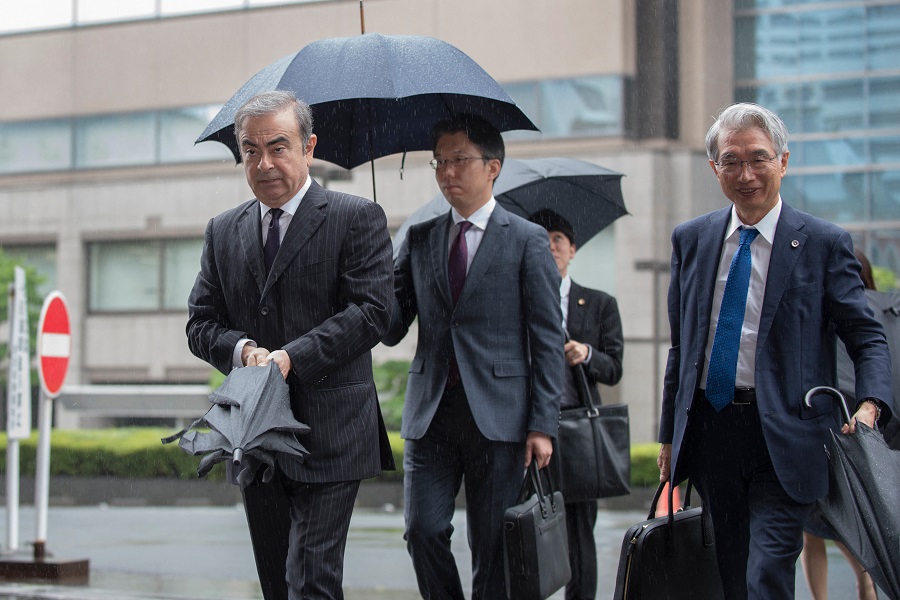
Former Nissan Motor Chairman Carlos Ghosn (L) and his layer Junichiro Hironaka (R) arrive for a pre-trial hearing at the Tokyo District Court in Tokyo on June 24, 2019. (File/AFP)
That is why Ghosn says he had to jump his $14 million bail and flee rather than face charges in what he claims to be an unfair trial.
“Whenever you have a coalition between executives in a company, the Tokyo prosecutor, and Hideki Makihara, the minister of industry in Japan, there is no more place for justice. It’s over. It’s a killer coalition where you have zero chance of prevailing.”
Ghosn likened his treatment to the 2011 Olympus scandal and others at Toshiba, Takata and Fukushima, where he claims the same hidden hands have wrangled their favored results.
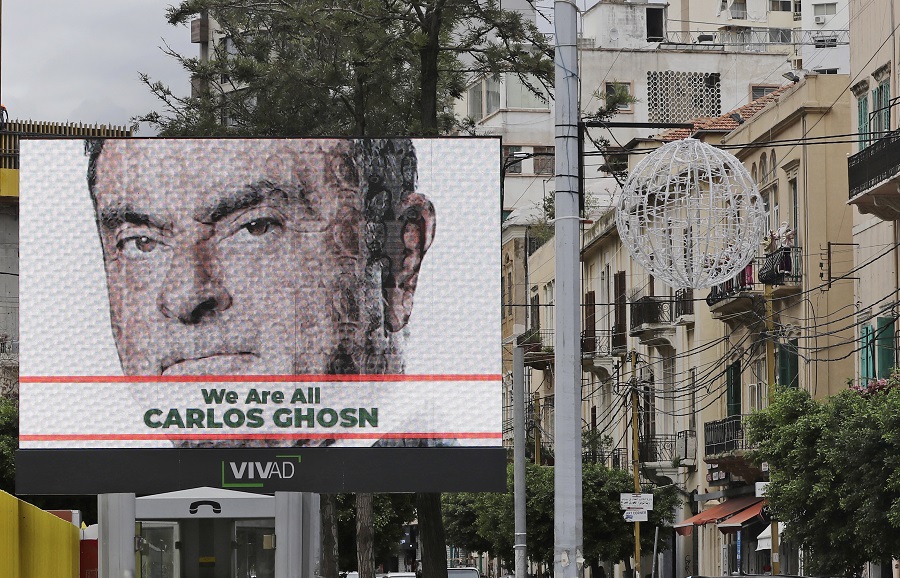
A portrait of ousted Nissan chairman Carlos Ghosn is seen on a publicity billboard in his support at a street in Beirut on December 6, 2018. (File/AFP)
Mainstream media has picked up on only a fraction of the murky world underpinning the whole debacle, says Ghosn, who intends to set the record straight in a new MBC documentary, “The Last Flight.”
“When you read the articles that are being published, and will continue to be published, they are focusing on one specific aspect, one specific individual, one specific event,” Ghosn said.
“I think this documentary, from what I’ve seen, is really giving somebody who is not aware or has little awareness about what was going on a sense about how it started, who the main actors are, and what forces are at play.”
Among those interviewed are officials in Japan’s justice ministry, a Japanese prosecutor, Ghosn’s Japanese lawyer, France’s former minister of finance, and Ghosn’s former boss.
Despite Ghosn and his wife Carole’s involvement in the feature’s production, he insists the film will offer a balanced portrayal of events.
“The interest into a documentary like this is to try to present the facts in a very objective way, giving the opportunity for the different parties to express themselves. So instead of the public listening to one voice which is biased about what happened, they have the opportunity to listen to the different voices and to the different positions.”
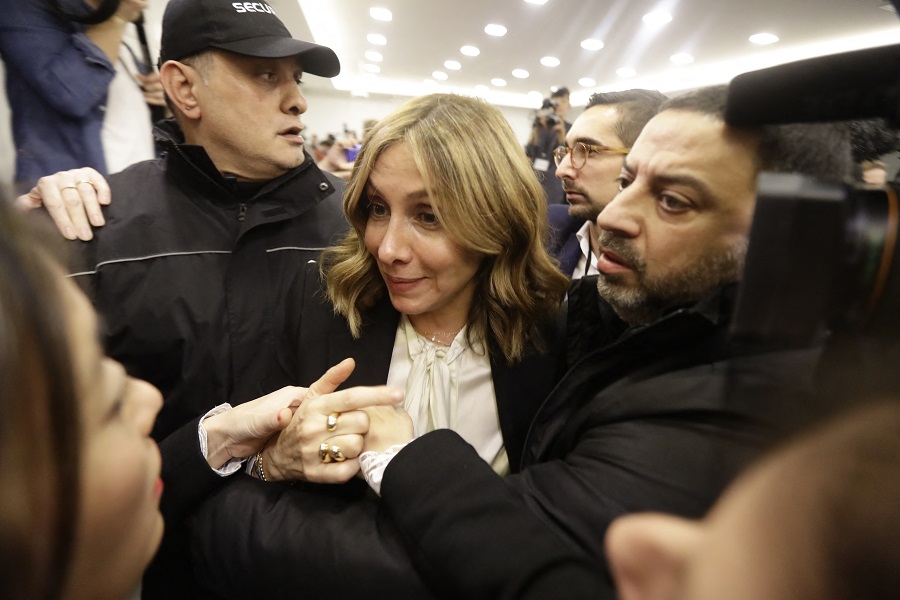
Carole, the wife of former Renault-Nissan boss Carlos Ghosn, leaves a press conference in which her husband addressed a large crowd of journalists on his reasons for dodging trial in Japan. (File/AFP)
The trials of Ghosn’s former colleague Greg Kelly and the two Americans who helped him escape — father and son Michael and Peter Taylor — were continuing at the time of this interview.
On Monday, both Taylors confessed to aiding and abetting the auto executive’s escape from Japan to Lebanon via Turkey in December 2019 in exchange for $1.3 million. Ghosn believes the documentary will have no impact on the outcome of the Kelly and Taylor trials.
Nevertheless, he said he is the victim of a character assassination orchestrated by the Japanese government, the French media and his former employers in response to his role in the Nissan-Renault-Mitsubishi alliance — an attack he was unable to challenge in the public domain.
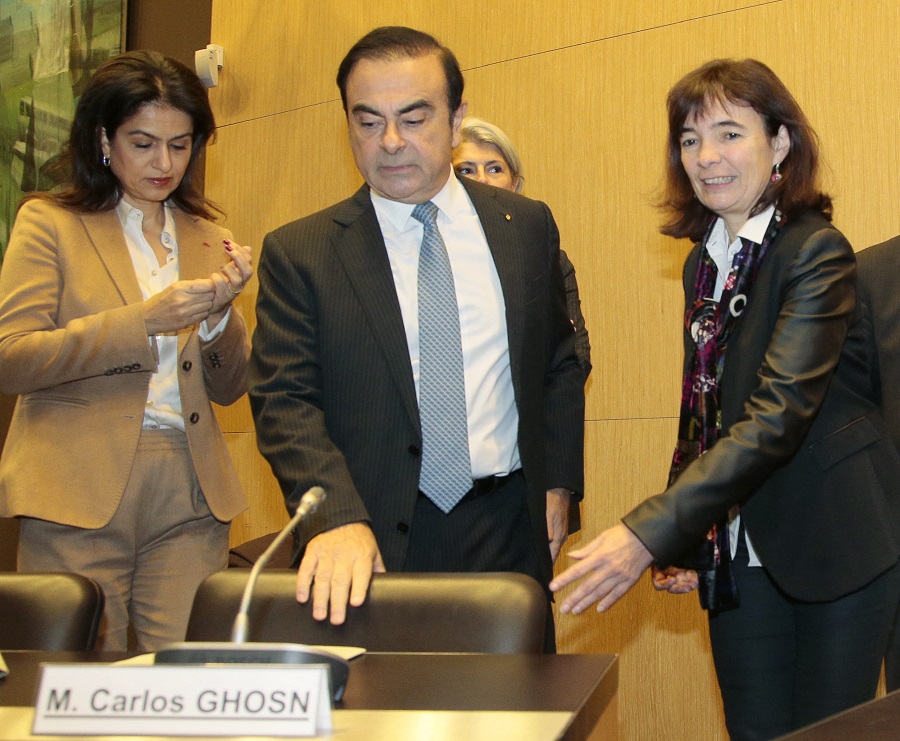
French carmaker Renault CEO Carlos Ghosn (C) arrives on February 17, 2016 at the French National Assembly, before addressing the Economical and Financial commissions during a hearing. (File/AFP)
“Between November 2018 and December 2019 when I flew out, I was not authorized to talk. I couldn’t talk to the press. Every time I tried to talk to the press, I paid a very high price for it,” Ghosn said.
“So for 14 months, we had a litany of information about a character assassination, the source of which was Tokyo, with the collusion of the Japanese government, the Tokyo prosecutor’s office and Nissan from one side, relayed unfortunately by French public officials, some Renault accomplices, and the media in France, around the angle that they didn’t support this guy because there was something fishy about what he has done in the companies.”
Ghosn has already tried to tell his side of the story in two books: the first, published in French and Arabic, and soon to be translated to English and Japanese, setting out to counter the allegations made against him, while the second, co-written by his wife, describes the “human side” of the story, “how we have been, from her side and my side, dealing with this ordeal during these 14 months.”
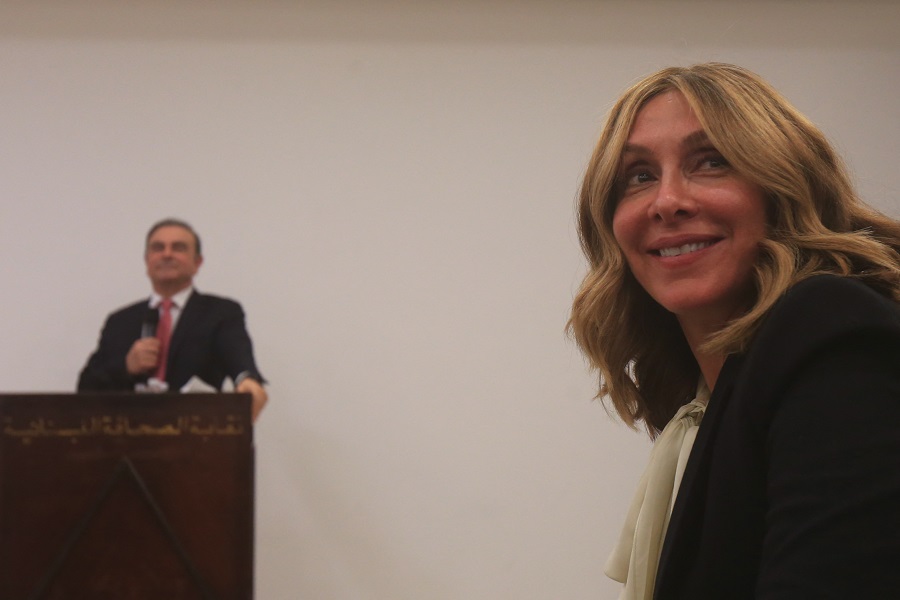
Carole, the wife of former Renault-Nissan boss Carlos Ghosn, attends a press conference in which her husband (L) addressed a large crowd of journalists on his reasons for dodging trial in Japan. (File/AFP)
Following his escape from Japan, Ghosn headed to his native Lebanon, where his wife was waiting for him. He has been there ever since.
With his days as an executive in the automotive industry over, Ghosn has occupied himself with pro bono work with the Holy Spirit University of Kaslik, where he has developed a business program. He is also involved with several local startups.
Dubbed “Mr. Fix It” for essentially saving Nissan from bankruptcy, Ghosn strongly denies he has designs on a career in politics to help rescue Lebanon from economic ruin.
“I’m dedicating my time to re-establishing my reputation, defending my rights, fighting the different legal battles that have been launched against me or that are launching against the company that treated me so badly,” he said.
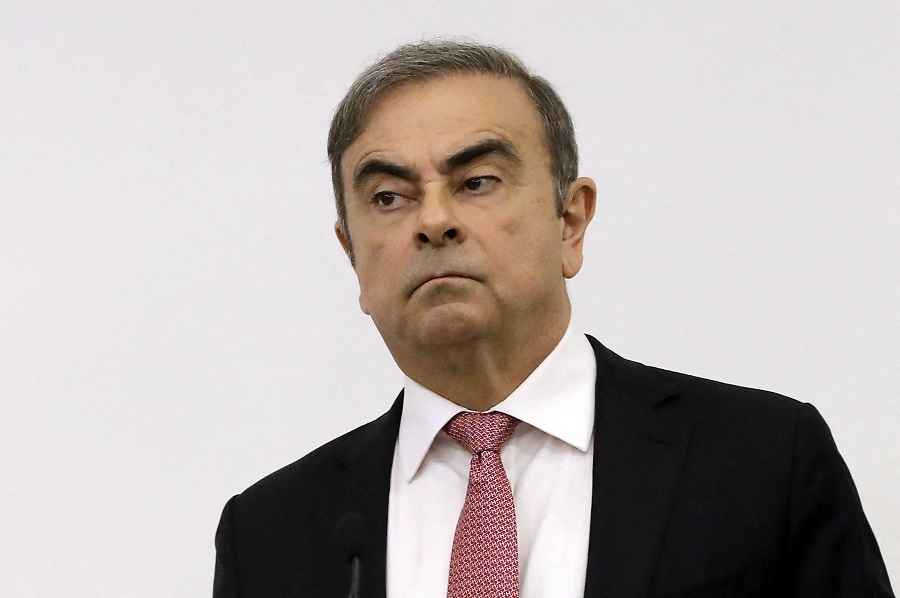
Former Renault-Nissan boss Carlos Ghosn looks on before addressing a large crowd of journalists on his reasons for dodging trial in Japan. (Supplied)
Lebanon faces an unprecedented crisis on multiple fronts. Its currency has lost more than 90 percent of its value on the black market and the country is struggling with shortages of gas and electricity.
Following 10 months of deadlock, Prime Minister-designate Saad Hariri is still trying to form a cabinet amid seemingly endless squabbling with Michel Aoun, the country’s president, and his son-in-law, the US-sanctioned former foreign minister Gebran Bassil.
On top of all this, the country is reeling from the Aug. 4, 2020 Beirut port blast, which leveled a whole city district and left more than 200 dead and thousands more wounded. Ghosn nevertheless believes Lebanon can find workable solutions if it implements proper reforms.
“I think there is a perception that this problem is so complicated that there is no obvious solution. This is wrong. There is no problem that man has created that man cannot solve.
“This requires choices. This also means that whoever the Lebanese public decides to back makes choices, that they implement reforms, and that these reforms are successful.
“This is not the only country in the world that has this kind of economic dysfunction.”
Twitter: @Tarek_AliAhmad




























